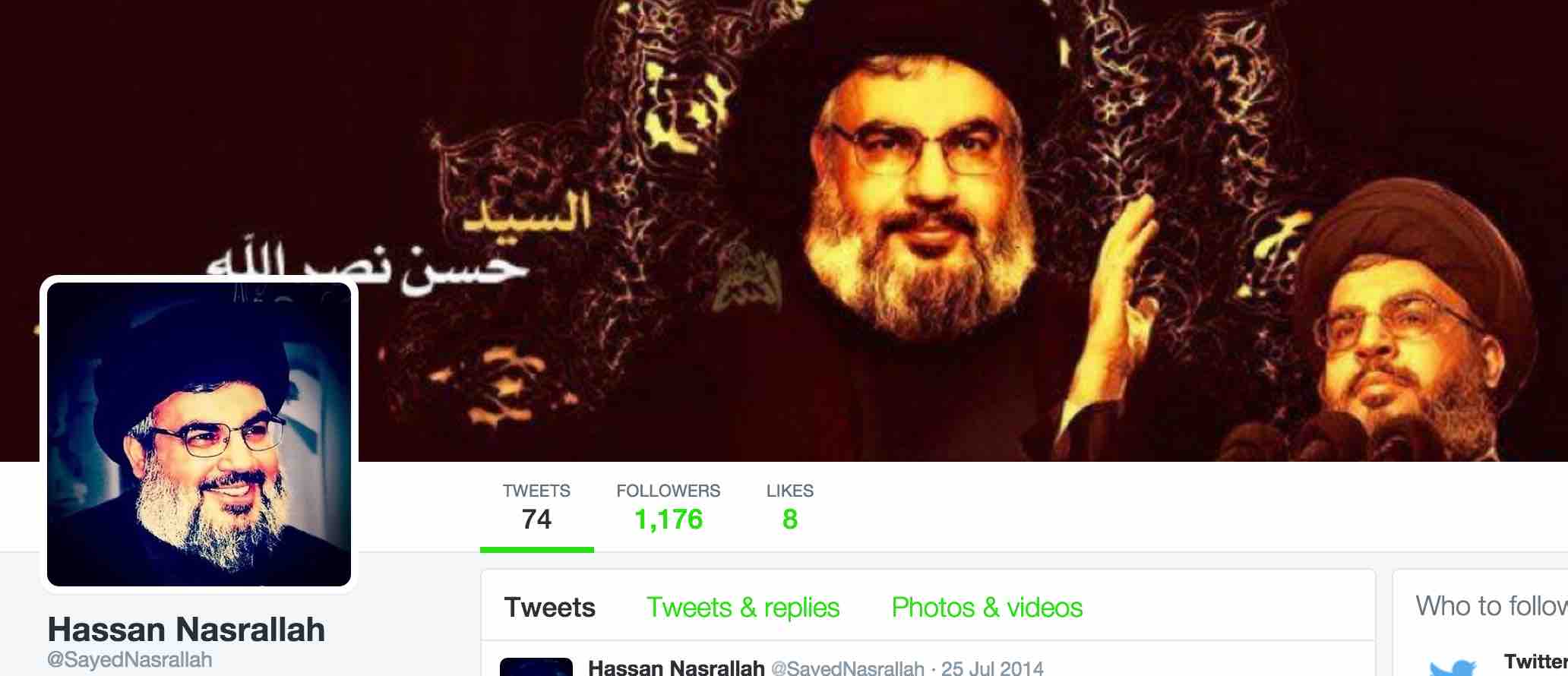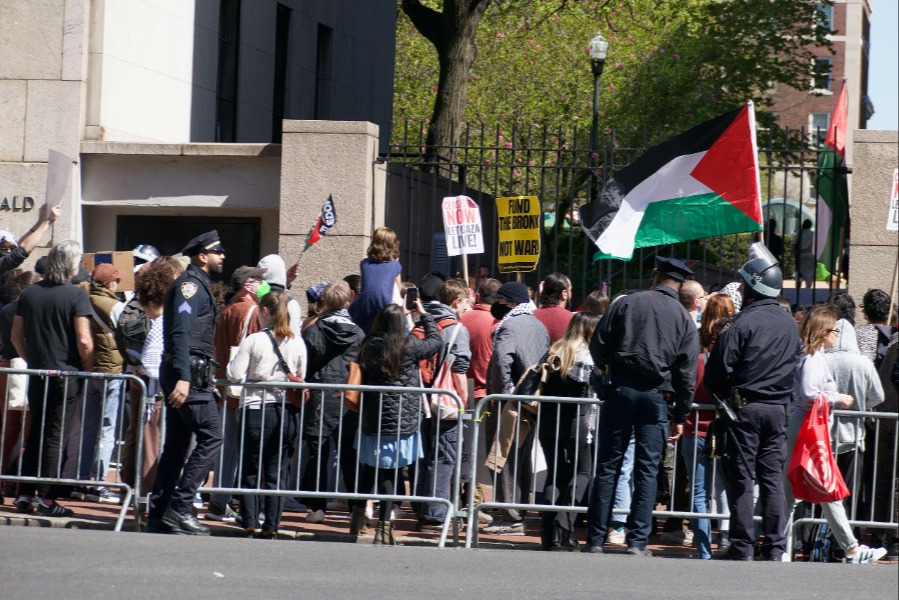Tweeting Terrorists, Part I: Don’t Look Now But a Lot of Terrorist Groups are Using Twitter
Guess how many designated foreign terrorist organizations have apparently official Twitter feeds. Hint: More than you probably think.

Published by The Lawfare Institute
in Cooperation With

In a recent post on the subject of Twitter, ISIS, and civil liability under the material support for terrorism law, we posed what seemed to us like a far-fetched hypothetical:
Imagine for a moment that Twitter ran a promotion in which it gave selected users the ability to run a certain number of “Promoted” tweets for free. Imagine that full well knowing who he was, Twitter offered this promotion to Abu Bakr Al-Baghdadi. Imagine further that Al-Baghdadi then tweeted, “Kill Zoe Bedell and Benjamin Wittes now!” and that Twitter promoted that tweet to hundreds of thousands of people, one of whom read it, killed us both, and admitted that he did so in response to the tweet.
In the current litigation against Twitter for helping ISIS—and in much of the current debate—the working premise has been that Twitter is providing service to individuals who may be associated with or recruiting for terrorist groups, or even engaged in terrorism. The relevant question, therefore, has been whether the company is responding seriously enough in countering the systematic abuse of its platform by people whom it may not initially know are terrorist operatives.
Twitter has fired back in response, attempting to show how vigorous its efforts have actually been. The other day, Twitter made headlines by revealing that it had suspended 125,000 accounts believed to be associated with ISIS over the previous six months. Our hypothetical was intended to illustrate that the material support issues are sharper analytically if Twitter were providing service directly to designated foreign terrorist groups, and not merely to activists and operatives affiliated with them.
It turns out that reality is a bit closer to our hypothetical than we understood. Unless this account (which has only 35 followers) turns out to be real, Mr. Al Baghdadi has not, to our knowledge at least, set up a Twitter account. But it seems that a lot of designated foreign terrorist organizations (DFTO)—and their leaders—actually have. These accounts operate both openly and flagrantly.
Below, we’ve undertaken a survey of DFTOs on Twitter. At the outset, it is important to emphasize that we have no way of knowing for certain which of these accounts is real, which is fake, and which is real but less-officially-sanctioned than might appear. None has been bestowed with the coveted blue check of verification.

And the factual determination as to an account's authenticity and officialness, as we will discuss in a later post, is critical in assessing the question of whether Twitter is knowingly providing service to a DFTO, the relevant standard under the material support law.
Indeed, it is not always easy to classify these accounts. Even with three years of college Arabic, Zoe is at a loss to understand tweets like these; and she has three more years of Arabic than Ben does. Because we may miss political and cultural cues with respect to some of these accounts, readers more steeped in these conflicts and groups may recognize a fake that we can’t detect.
Some accounts are obviously spoofs (Crossfit al-Shabaab is a particular favorite) as is the famous Al Qaeda twitter account, which tweets things like this:
We’ve really lost momentum. #is, guns & cancer are topping everyone’s threat list. Us? We’re somewhere below toenail fungus & Lady Gaga.
— Al-Qaeda (@alqaeda) January 14, 2016
But even among the accounts that look real, there’s nothing to stop, say, a Hezbollah sympathizer from setting up an account in the organization’s name (or near-name) and tweeting sympathetic material. This Long War Journal post on the fake Ansar Jerusalem account that claimed responsibility for a terrorist attack illustrates the difficulty in attributing ownership. There, somewhat ironically, the evidence supporting the conclusion that the account in question was not an official one included posts on other “[j]ihadist-linked Twitter accounts” and “users on jihadist forums” encouraging fellow jihadists to report the unofficial account.
For present purposes, we will say only that the following accounts are—by our estimation at least—apparently real and they apparently represent official entities that are either DFTOs or are organizations with which transactions are proscribed by the Treasury Department’s Office of Foreign Assets Control (OFAC).
For starters, fans can find Hamas on Twitter in several forms. First, there’s the organization’s English language account, which encourages followers to #AskHamas questions. If you prefer to jump straight to the military action, you can follow the Al Qassam Brigades—Hamas’s military wing and a separately designated foreign terrorist organization. (The State Department conveniently makes available its list of such designations.)
Martyr Amjad Sukari is a policeman in #Ramallah's government , he was killed after shooting 3 Israeli soldiers. pic.twitter.com/cdJQVPkS7O
— Al Qassam Brigades (@qassamsms) January 31, 2016
Hezbollah also has several accounts. We have our doubts about the one that purports to be the group’s main account. More clearly real is the account for Hezbollah’s TV station (the TV station is not itself a DFTO, though it is an OFAC Specially Designated Foreign Terrorist Entity). And Hassan Nasrallah—the organization’s general secretary—apparently has an account too (not a lot of followers, though, poor guy). Again, Nasrallah himself is not a DFTO, but he is both an OFAC Specially Designated National in his own right and the head of a DFTO.
Other Middle East-based terrorist organizations on Twitter include the Popular Front for the Liberation of Palestine, the Popular Front for the Liberation of Palestine General Command, Ansar al-Islam (which apparently has more than one account), and Kata’ib Hezbollah (tweeting in three languages).
Kata'ib Hezbollah's Commander warns against sending Arab forces to Iraq & Syria will open "gates of hell" pic.twitter.com/GlWzE2DYqT
— Kata'ib Hezbollah (@KataibHezbollah) February 10, 2016
From Turkey, the PKK’s English account promotes articles from the group’s official site:
The Nation-State Can Never Be a Solution | Partiya Karkerên Kurdistan - PKK Official Site http://t.co/DVK4YBNrM7
— PKK (@PKK_English) July 13, 2013
Al-Shabaab apparently hasn’t tweeted for well over a year, but nonetheless has multiple accounts operating under a slightly modified version of its name (the group is also known as Harakat Shabab Al-Mujahidin, or HSM).
Not to be left out, Pakistani groups Tehreek-e-Taliban and Lashkar-e-Taiba also seemingly have Twitter presences. The Lashkar-e-Taiba feed has been suspended since the time we began working on this article.
Pakistan doesn't belong to Punjabi, Pushtun, Sindhi&Baloch. It belongs to Tehreek-e-Taliban.
— Tehreek-e-Taliban (@Tehreek_Taliban) May 17, 2013
Our new strategy. Our 'Aims' r High, our 'Objectives' r Clear and our 'Targets' r Specific - politicians, generals & journalists.
— Tehreek-e-Taliban (@Tehreek_Taliban) May 15, 2013
Similarly, the Liberation Tigers of Tamil Eelam (LTTE) have account, as does Jemaah Ansharut Tauhid of Indonesia.
strive and fight for a greater Tamil Eelam...that is the only solution to us,Tamils of the world.that's the vision of our late great leader.
— LTTE (@LTTE) May 16, 2014
The PKK and the LTTE accounts are particularly notable because those were the specific DFTOs at issue when the Supreme Court considered and upheld the material support law only a few years ago.
Colombian groups are also represented: here’s the FARC, the account of Timoleon Jimenez, (the FARC’s leader), the FARC’s “peace delegation,” and the National Liberation Army (ELN). The ELN account has also been suspended since we began working on the piece.
TO MEET A GUERRILLA CAMP
— FARC-EP in English (@FARC_EPeace) February 9, 2016
...Therefore, they fall into easy counterinsurgency propaganda lies. pic.twitter.com/aMVsPOyuK3
Additional DFTOs have accounts that are of more questionable provenance.
This Revolutionary People’s Liberation Party/Front account has the name and at least some of the imagery to suggest it might be “real,” but no one has ever tweeted on it. This Jundullah account mainly retweets, and its few original tweets do not suggest anything especially sinister.
We’re not sure what to make of this account with a similar name (JundAllah), but a different handle (@salutsalut09).
And while the handle for the account claims to represent the Communist People’s Party/New People’s Army, its sometimes playful tweets suggest otherwise.
We are declaring a ceasefire! #aprilfools
— New People's Army (@CPPNPA) April 1, 2011
Does the occasional flash of humor suggest that the account is not official? Perhaps. But maybe terrorists like jokes as much as the next organization.
All told, of the State Department’s 57 DFTOs, at least 14 (and maybe as many as 19) have apparent Twitter accounts. Even allowing for a few fakes, that’s just about a quarter.
All of this raises the question: Is Twitter openly violating the material support laws? In our view, the answer is probably that it is. The more difficult question is whether the Constitution precludes applying that law against to Twitter for activity that bears some significant relationship to publication and speech. We will explore these questions in depth in successive posts.





